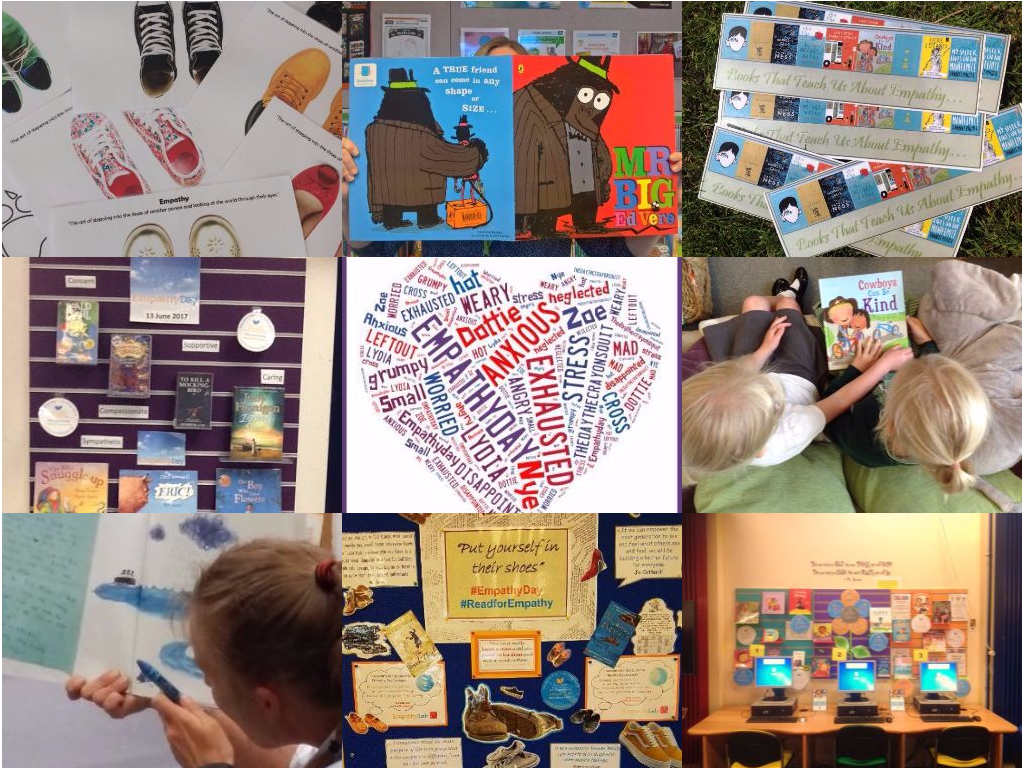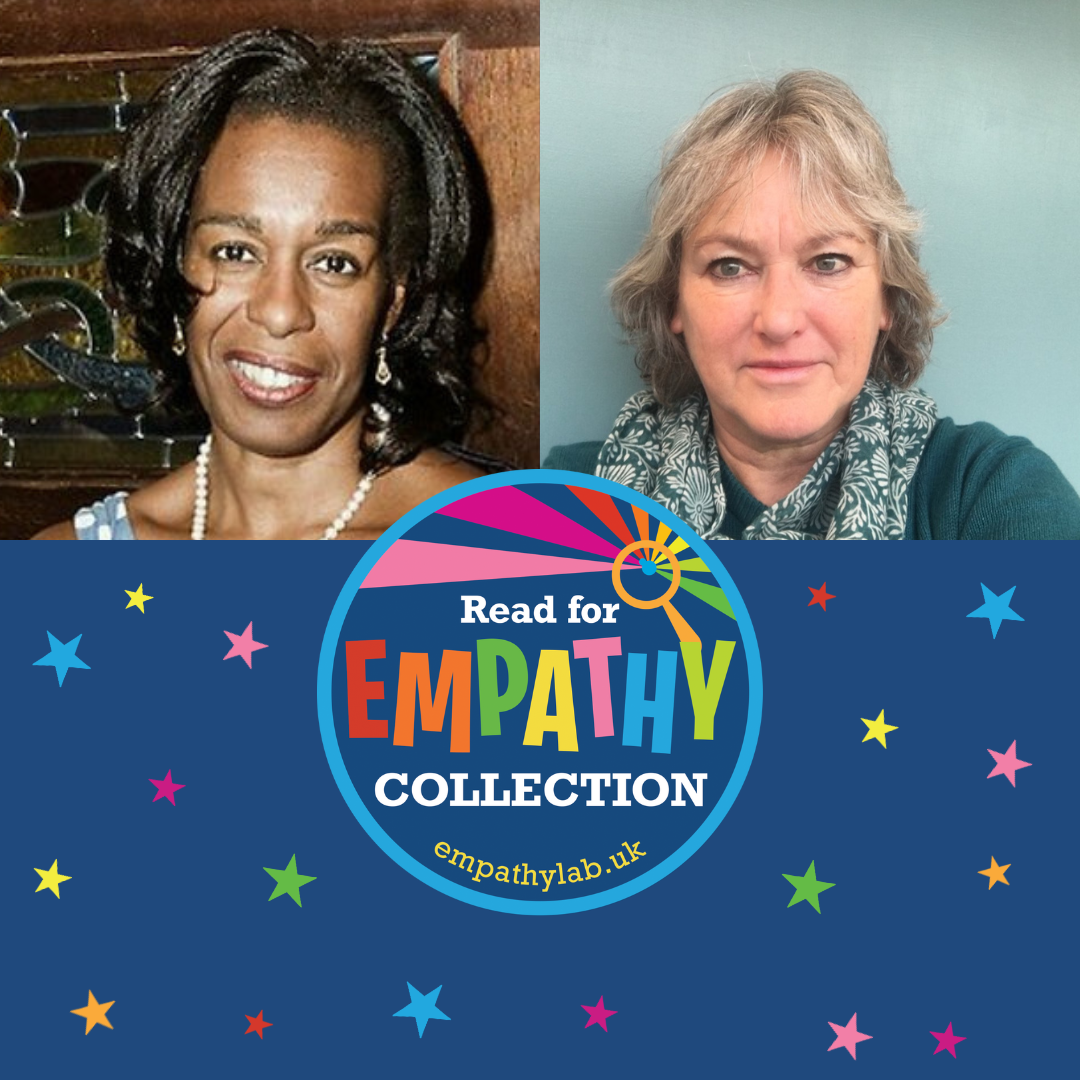Libraries and Empathy Day
- By EmpathyLab
- •
- 25 Jul, 2017
- •
“In libraries we can find out how the world looks to other people. That’s crucial.” -- Author Gillian Cross

Since Empathy Day on 13 June, we’ve been hearing from librarians who made things happen in communities, from empathy themed class visits to creative events based on a single book. They welcomed the chance to focus on how reading can help children build vital empathy skills – as one enthusiast tweeted: “libraries are Empathy Warehouses!”.
19 library services and two Schools Library Services joined in with Empathy Day, from North Tyneside to Devon. This was far more than we were expecting, and we’re thrilled by their creative response and the interest they generated in their communities.
Sheffield Libraries involved Chatterbooks reading group children from all over the city in a creative writing session led by author Nik Perring. Librarian Tina Barber reports: “children’s writing was based on empathy themed books that they’d read. We asked them to put themselves in a book character’s shoes and write a letter advising them how to make their situation more bearable. This produced some profound and moving pieces of work”. Nik Perring says “ This was something different. One of the most important things we can do as people is to think about what other people might be feeling, and putting ourselves in character’s shoes made for some really interesting discussion…we had characters with OCD, autism – we had bullying – all sorts. I met brilliant and talented and caring young people who made brilliant art and stories”.
St Helens libraries ran a series of very well received empathy class visits for targeted schools, exploring feelings and characters’ perspectives through a shared book. Younger children focused on David Litchfield’s The Bear and the Piano, and older children took a fresh look at what Goldilocks did before she broke into the bears’ house. Library staff created displays of books using the theme “walk in their shoes”. Kathryn Boothroyd, Service Development Manager, says: “libraries have a very important role in highlighting the vital part reading plays in supporting empathy skills, and help schools find suitable contemporary fiction for their pupils”
North Tyneside library staff made wordles based on their favourite children’s books. These were tweeted, posted on the library facebook page and used in an Empathy Day display. “Creating wordles made people think about the emotional impact of their favourite books, reinforcing the power of literature to enhance self awareness and a greater understanding and connection to the lives of others”.
Totton library in Hampshire worked with a local school, Netley Marsh Infants, supporting children’s work on making Empathy Awards to book characters showing exceptional empathy. The schools’ Executive Headteacher stationed herself at the library to encourage families to make several library visits in the run up to Empathy Day. The children loved it: “We can’t wait to find out which book has won the award. I am going to go to the library next time to get my book chosen.” (Y2 boy).
Essex Libraries piloted an empathy-focused event for young library users in Chelmsford, basing it on Oliver Jeffers’ superb book, The Day The Crayons Quit. Children aged 4-7 were very thoughtful in exploring the squabbling crayons’ different viewpoints, and learnt new words for feelings. This was a very different kind of story event, involving explicit exploration of emotions and different perspectives.
A big thank you to the library services and the many, many individual librarians who joined in Empathy Day. In creating libraries’ plans, we were delighted to be supported by the Society of Chief Librarians. We’re now talking to them and the participating library services about developing an exciting library for future Empathy Days.

The collection consists of 65 books for 3-16 year olds, each chosen for its unique contribution in building young people’s empathy.
The primary collection for 3-11 year has 40 books; the secondary collection features 25 books for 12-16 year olds.

I am very fortunate to have been on the Read for Empathy booklist judging panel over the past few years.
I’m also a practising classroom teacher so I would like to consider how the books on the list can influence what happens in a school.
Firstly, along with many other schools, reading aloud is an important part of our school day, every day, almost without fail. All the teachers at my school are aware of the EmpathyLab booklist, and often use it as a basis for choosing their next class read. Knowing that the books touch on important aspects of our children’s lives is key; we all understand how important representation is in stories. These are books that make a difference, that lead to passionate discussions in the classroom and can actually influence children’s behaviour .
The booklists become increasingly valuable. We have a couple of hundred empathy texts at our school – they are there on merit. Staff often refer to previous lists if there as a particular aspect of empathy that they want to include or share with the children.
Our Year 6 Reading Champions often seek out picture books from the list to take in to KS1 and Reception when they read stories, so we already have the next generation educating each other about the importance of empathy. I love the fact they often meet beforehand (they tend to work in twos) to discuss what questions they might want to ask the children once the story has been read. After each booklist is released, they also spend several of their Friday recommendation slots in assembly talking about a couple of the books. We have parents in on our Friday assembly so it’s a great way to share the texts with them and help raise their awareness of our work.
We often use the books as our teaching texts for English, partly because they encourage excellent writing but also because they provide a fantastic opportunity for our pupils to develop their empathy skills. The Wild Robot by Peter Brown, Miraculous Journey of Edward Tulane by Kate DiCamillo, Freedom by Catherine Johnson, Eyes that Kiss in the Corners by Joanna Ho and A Street Dog Named Pup by Gill Lewis are all books that have made in into our English curriculum as a result of being on one of the Read for Empathy booklists. Well, that’s not strictly true - Edward Tulane was there before that as it’s one of my favourite ever books, but you hopefully take my point.
Reflecting on our empathy journey over the past few years, I’ve also found that the more books children read that address empathy, where they can relate to the characters and their choices, the more books they want to read. It’s almost a virtuous circle. Many begin to realise that such books can empower them to think about situations.
For example, as soon as we finished A Street Dog Named Pup last year, several of them immediately wanted to read other books by Gill Lewis. Because empathy is a thread that runs through much of her work ( Gorilla Dawn , Moon Bear , The Closest Thing to Flying and so on). Thanks to EmpathyLab's lists, I was able to point them in the direction of several other books, by her and others.
I think we agree that teaching children about empathy and providing them with opportunities to develop it is one of the most important gifts we can give them as adults. The fact that empathy has gone from being something that schools sort of understood a few years ago to being something that has got an increasingly solid evidence base is crucial.
There’s always been anecdotal evidence that reading stories is important for children and that it can change how they think but now that’s backed up with research. The empathy revolution (and it is a revolution) is only going to pick up more momentum over the next few years as the need for it becomes ever more apparent. Working in schools and in the world of children’s books means that we’re in the front line. There’s nowhere else I’d rather be.
